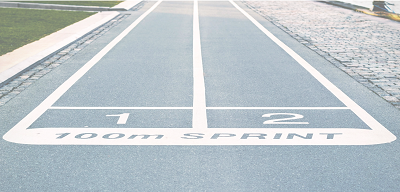Managing Competition Anxiety While Staying-At-Home
Managing Competition Anxiety While Staying-At-Home

For all athletes, the outbreak of COVID-19 brought competition to a striking halt. Many who were ramping up their training regimen for an upcoming tournament, or helping their team strengthen their playoff seeding, were heartbroken to hear there were no more games to be played. Some athletes have spoken publicly about their immense feelings of disappointment, sadness, and anger. However, some athletes who describe themselves as being more anxious in nature are reporting that the absence of competition has actually been more of a relief. Time away from their sport is an unexpected opportunity for these athletes to work on their fear, worry and concern around sports and competition.
Competition anxiety is the term for when an athlete experiences anxiety symptoms when faced with what they consider high-stakes competition. In these situations, they might show the physical manifestations of anxiety, such as sweaty palms, shallow breathing, pounding heart, and negative mind chatter. Despite their talent and months (if not years) of physical training to prepare their bodies to compete, the anxious athlete’s mind sabotages their best intentions.
Even though there is a quarantine, there is plenty that can be accomplished to help prepare the athlete for their return to their sport. Here are 3 mental skills that we teach anxious athletes that they can do from their homes.
1. Practice under pressure: If you’re able to practice your sport, create conditions to simulate some sense of pressure. For example, we always encourage our basketball clients to set a goal that they won’t leave the practice court until, for example, they make eight out of ten free throws. For players who dread being fouled and having to go to the free throw line, this is a helpful strategy. Research in the field of anxiety shows that by slowly exposing ourselves to the feared situations in our lives, we can gradually decrease our feelings of anxiety towards it. However if you decide to practice under pressure, we encourage you to add consequences such as extra fitness (e.g, down and back sprints) each time you fall short of your target, which can help you simulate stressful game conditions. Be mindful of whether you tend focus more on needing to reach the outcome (which isn’t helpful), versus relaxing the mind and body, and keeping your thoughts focused on what you can control. When you return to play, these “practice-under-pressure” sessions will serve as a good reminder of how hard you have worked to build the mental muscles you need to stay cool under pressure.
2. Breathing: When we experience stress in performance situations, our brain signals our body to breathe shallowly and rapidly. The problem is this can amplify the feelings of competition anxiety. Thankfully, we can train the brain to reverse this process by practicing slow, deep breathing using our diaphragms. For clients who have never practiced breathing in this way, they can imagine that they are breathing air up from their feet and filling up a small balloon in their stomachs with their breath. We also recommend typing in “Diaphragmatic Breathing” on YouTube for a visual demonstration. During this stay-at-home period, we encourage you to practice diaphragmatic breathing two times per day for ten minutes in each sitting. If you haven’t tried this before, there’s no better time while you are stuck at home. The benefit is an increased feeling of relaxation, reduced muscle tension, and as performers know, a relaxed body and more nimble mind is a recipe for greater success.
3. Reframing: It’s normal to feel some anxiety about things we’ve put our heart and soul into and that are important to us. However, these feelings of anxiety can trick us into thinking things can and will go wrong. Research in sports has shown that it is not the presence of anxiety that influences performance as much as how one interprets their feelings of fear and tension. During this stay-at-home period, we encourage you to write down a list of the scenarios where your competition anxiety overwhelms you. Then, next to this list, write down how you could possibly reframe or reinterpret these feelings of competition anxiety. For example, maybe you start to feel some of the signs of competition anxiety right as the game is about to start. A reframe could be “these feelings are simply my body preparing itself for competition.” Even pressure itself can be reframed. As tennis legend Billie Jean King famously stated, “pressure is a privilege, and it comes to those to earn it.” The most important skill here to develop is the awareness that there are multiple ways to perceive even the most stressful of circumstances. With practice, even the most anxious of athletes can find a sense of feeling more in control of their emotions.
It’s important to remember that these are all skills, and all skills require practice in order to be able to effectively implemented. Now that you have some extra time on your hands while staying at home, commit yourself to practicing these skills and making them your own. We have found and our clients have reported, just a small improvement in these areas can lead to great relief and feelings of improved confidence.













